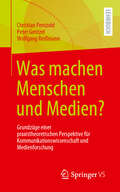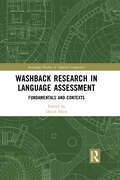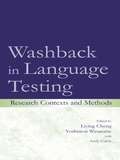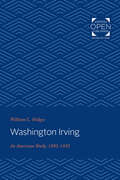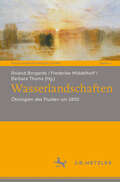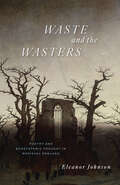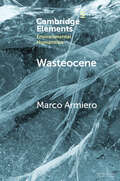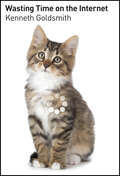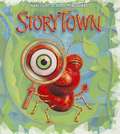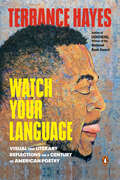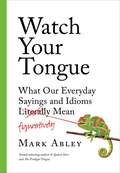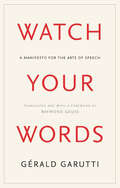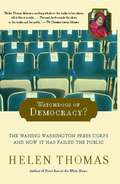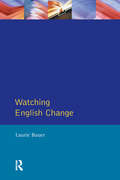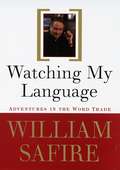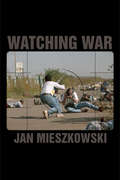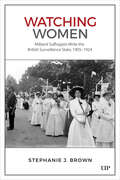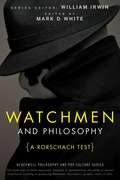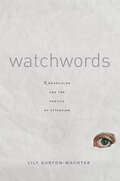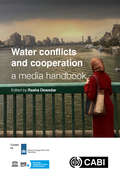- Table View
- List View
Was machen Menschen und Medien?: Grundzüge einer praxistheoretischen Perspektive für Kommunikationswissenschaft und Medienforschung
by Wolfgang Reißmann Christian Pentzold Peter GentzelDie Rede von Praktiken ist in der Kommunikations- und Medienwissenschaft weit verbreitet. Eine systematische Diskussion des Potenzials praxistheoretischer Denk- und Forschungsansätze steht dagegen noch aus. Dieses Buch ist eine Einladung zur tieferen Beschäftigung mit Medienpraktiken und wirbt für eine entsprechende Neuorientierung von Kommunikationsforschung und Medienanalyse. Dazu wird der Status quo praxistheoretischer Ansätze in der Kommunikations- und Medienwissenschaft kompakt vorgestellt. Interessierte bekommen einen Einstieg und Expert:innen werden Anschlussmöglichkeiten angeboten. Es geht sowohl um Grundprinzipien praxistheoretischen Denkens als auch um die sich daraus ergebenden Haltungen sowie um Zugänge für praktische Untersuchungen. Im Zentrum stehen aktuelle Herausforderungen und die Möglichkeiten, Praktiken in Digitalmedien und vernetzten Medienumgebungen zu analysieren.
Washback Research in Language Assessment: Fundamentals and Contexts (Routledge Studies in Applied Linguistics)
by David AllenWashback is understood as the effect tests have on teaching and learning, with positive washback producing intended outcomes and negative washback generating unintended effects. By surveying the latest developments in the field and charting future directions, this collection offers a comprehensive treatment of research on washback in the field of language assessment.The book contains chapters exploring fundamental aspects of washback, including the impact-by-design approach, theoretical models, validity frameworks, research designs, and methods. Additional chapters examine washback across various assessment contexts, covering migration-related proficiency tests, formative and standards-based assessments, multilingual and professional language assessments, and the role of technology, including computer-based testing and AI. The book also surveys washback research in primary, secondary, and higher mainstream education, and shadow education, with a focus on English learning in Asian contexts.This book will be of interest to scholars and stakeholders in language testing and assessment, educational measurement, and applied linguistics.
Washback in Language Testing: Research Contexts and Methods
by Andy Curtis Liying Cheng Yoshinori WatanabeWashback refers to the influence of language testing on teaching and learning. This volume, at the important intersection of language testing and teaching practices, presents theoretical, methodological, and practical guidance for current and future washback studies. In the field of language testing, researchers' major interest has traditionally been focused on issues and solving problems inherent in tests in order to increase their reliability and validity. However, the washback effect goes well beyond the test itself to include factors, such as curriculum, teacher and learner behaviors inside and outside the classroom, their perceptions of the test, and how test scores are used. Only recently have researchers started to empirically investigate the phenomenon of washback. This volume of such research serves two essential purposes by:*providing an overview of the complexity of washback and the various contextual factors entangled within testing, teaching, and learning; and *presenting empirical studies from around the world that offer insights into the effects of washback in specific educational contexts and models of research on which future studies can be based. The extensive use of test scores for various educational and social purposes in society nowadays makes the washback effect a high-interest phenomenon in the day-to-day educational activities of teachers, researchers, program coordinators/directors, policymakers, and others in the field of education. Washback in Language Testing: Research Contexts and Methods is a valuable resource for those who are interested in the application of findings to actual teaching and learning situations or conduct washback research in their own contexts, including educational and psychological testing experts, as well as alternative assessment people in all fields, and for policy- and decision-makers in educational and testing organizations.
Washington Irving: An American Study, 1802-1832 (Goucher Colloquium)
by William L. HedgesOriginally published in 1965. Despite his prolificacy, Washington Irving remained an underexamined figure among literary scholars at the time William L. Hedges published his definitive study of the author in 1965. Most contemporary scholars believed that Irving's central contribution to the American literary tradition was that his work was "polished" and "suave." These scholars maintained that Irving's aristocratic sensibilities defined the stylistic choices of his literary works. To assume this, Hedges contends, is to "both let the man and the work slip beyond one's grasp." Hedges demonstrates that much of Irving's work can be understood in the context of his conflict between federalist and conservative politics. Irving, in other words, found himself incapable of committing to a coherent set of beliefs or attitudes, and this cultural uneasiness manifested itself in his early work. Washington Irving: An American Study, 1802-1832 tries to correct some of the misapprehension about Irving's place in nineteenth-century American literature.
Wasserlandschaften: Ökologien des Fluiden um 1800 (Neue Romantikforschung #9)
by Roland Borgards Frederike Middelhoff Barbara ThumsWasser erhält Ende des 18. und im Verlauf des 19. Jahrhunderts lokal und global betrachtet den Status eines ‚Superelements‘: Es wird ökonomisch (Dampfmaschine), naturwissenschaftlich (Neptunismus), ästhetisch und kunsttheoretisch (von der Landschaftsmalerei und -dichtung bis hin zur Gartenkunst) zum Motor, Medium und Modell für die Dynamiken der Moderne. In diesem Kontext werden Wasserlandschaften insbesondere in den europäischen Romantiken zu privilegierten (Denk-)Räumen und Umwelten, um Wechselwirkungen zwischen unterschiedlichen organischen und anorganischen Akteuren zu beobachten und deren Dynamiken ästhetisch in Szene zu setzen. Durch das stets volatile Prisma der Wasserlandschaften kommen auf diese Weise ökologische Beziehungen auch in ihren lokalen Besonderheiten in den Blick. Der Band erkundet den Stellenwert und die Materialität des Wassers um 1800 anhand konkreter Beispiele wasserlandschaftlicher Formationen in Literatur, Malerei und Musik. Philosophische und wissensgeschichtlich orientierte Perspektiven werden dabei ebenso berücksichtigt wie neuere Ansätze der ökokritischen Forschung und der Blue Humanities. Ausgelotet wird in diesem Zusammenhang auch das Verhältnis von Wasser, Landschaftsästhetik und ökologischem Denken.
Waste and the Wasters: Poetry and Ecosystemic Thought in Medieval England
by Eleanor JohnsonA groundbreaking examination of ecological thought in medieval England. While the scale of today’s crisis is unprecedented, environmental catastrophe is nothing new. Waste and the Wasters studies the late Middle Ages, when a convergence of land contraction, soil depletion, climate change, pollution, and plague subsumed Western Europe. In a culture lacking formal scientific methods, the task of explaining and coming to grips with what was happening fell to medieval poets. The poems they wrote used the terms “waste” or “wasters” to anchor trenchant critiques of people’s unsustainable relationships with the world around them and with each other. In this book, Eleanor Johnson shows how poetry helped medieval people understand and navigate the ecosystemic crises—both material and spiritual—of their time.
Waste and the Wasters: Poetry and Ecosystemic Thought in Medieval England
by Eleanor JohnsonA groundbreaking examination of ecological thought in medieval England. While the scale of today’s crisis is unprecedented, environmental catastrophe is nothing new. Waste and the Wasters studies the late Middle Ages, when a convergence of land contraction, soil depletion, climate change, pollution, and plague subsumed Western Europe. In a culture lacking formal scientific methods, the task of explaining and coming to grips with what was happening fell to medieval poets. The poems they wrote used the terms “waste” or “wasters” to anchor trenchant critiques of people’s unsustainable relationships with the world around them and with each other. In this book, Eleanor Johnson shows how poetry helped medieval people understand and navigate the ecosystemic crises—both material and spiritual—of their time.
Wasteocene: Stories from the Global Dump (Elements in Environmental Humanities)
by Marco ArmieroHumans may live in the Anthropocene, but this does not affect all in the same way. How would the Anthropocene look if, instead of searching its traces in the geosphere, researchers would look for them in the organosphere, in the ecologies of humans in their entanglements with the environment? Looking at this embodied stratigraphy of power and toxicity, more than the Anthropocene, we will discover the Wasteocene. The imposition of wasting relationships on subaltern human and more-than-human communities implies the construction of toxic ecologies made of contaminating substances and narratives. While official accounts have systematically erased any trace of those wasting relationships, another kind of narrative has been written in flesh, blood, and cells. Traveling between Naples (Italy) and Agbogbloshie (Ghana), science fiction and epidemic outbreaks, this Element will take the readers into the bowels of the Wasteocene, but it will also indicate the commoning practices which are dismantling it.
Wasting Time on the Internet
by Kenneth GoldsmithUsing clear, readable prose, conceptual artist and poet Kenneth Goldsmith’s manifesto shows how our time on the internet is not really wasted but is quite productive and creative as he puts the experience in its proper theoretical and philosophical context.Kenneth Goldsmith wants you to rethink the internet. Many people feel guilty after spending hours watching cat videos or clicking link after link after link. But Goldsmith sees that “wasted” time differently. Unlike old media, the internet demands active engagement—and it’s actually making us more social, more creative, even more productive.When Goldsmith, a renowned conceptual artist and poet, introduced a class at the University of Pennsylvania called “Wasting Time on the Internet”, he nearly broke the internet. The New Yorker, the Atlantic, the Washington Post, Slate, Vice, Time, CNN, the Telegraph, and many more, ran articles expressing their shock, dismay, and, ultimately, their curiosity. Goldsmith’s ideas struck a nerve, because they are brilliantly subversive—and endlessly shareable.In Wasting Time on the Internet, Goldsmith expands upon his provocative insights, contending that our digital lives are remaking human experience. When we’re “wasting time,” we’re actually creating a culture of collaboration. We’re reading and writing more—and quite differently. And we’re turning concepts of authority and authenticity upside-down. The internet puts us in a state between deep focus and subconscious flow, a state that Goldsmith argues is ideal for creativity. Where that creativity takes us will be one of the stories of the twenty-first century.Wide-ranging, counterintuitive, engrossing, unpredictable—like the internet itself—Wasting Time on the Internet is the manifesto you didn’t know you needed.
Watch Your Language: Visual and Literary Reflections on a Century of American Poetry
by Terrance HayesFrom the National Book Award–winning author of Lighthead, Terrance Hayes, a fascinating collection of graphic reviews and illustrated prose addressing the last century of American poetry—to be published simultaneously with his latest poetry collection, So to SpeakCanonized, overlooked, and forgotten African American poets star in Terrance Hayes's brilliant contemplations of personal, canonical, and allegorical literary development. Proceeding from Toni Morrison's aim to expand the landscape of literary imagination in Playing in the Dark ("I want to draw a map, so to speak, of a critical geography"), Watch Your Language charts a lyrical geography of reading and influence in poetry. Illustrated micro-essays, graphic book reviews, biographical prose poems, and nonfiction sketches make reading an imaginative and critical act of watching your language. Hayes has made a kind of poetic guidebook with more questions than answers. "If you don't see suffering's potential as art, will it remain suffering?" he asks in one of the lively mock poetry exam questions of this musing, mercurial collection. Hayes's astonishing drawings and essays literally and figuratively map the acclaimed poet's routes, roots, and wanderings through the landscape of contemporary poetry.
Watch Your Tongue: What Our Everyday Sayings and Idioms Figuratively Mean
by Mark AbleyPhrases, idioms, and clichés—why do we say the things we say? Watch Your Tongue explores weird and wonderful everyday sayings and what they reveal about us.Do you ever wonder why you shouldn’t have a cow but you should seize a bull by its horns? Who has the better reputation in language—cats or dogs? Do you sometimes feel that our speech is all smoke and mirrors or that our expressions simply make no sense? In Watch Your Tongue, award-winning author Mark Abley explores the phrases, idioms, and clichés of our everyday language. With wit and subtle wisdom, he unravels the mysteries of these expressions, illuminating the history, tradition and stories behind everything we say. Pulling examples from Shakespeare’s plays to sports team names, ancient Rome to Twitter, Abley shares samples and anecdotes of the eccentric ways that we play with, parse, and pattern language. Why do so many companies use fruit for their brand names? What do politicians mean when they say they’re going to “drain the swamp”? Why does English use chickens to signify cowardice? Abley dives into the history and psychology behind these examples and countless others, unpacking their significance (and sheer absurdity) to show how our language developed, where it is headed, and what we can learn about ourselves from it. Whimsically illustrated, easily browsable, and full of catchy sidebars, Watch Your Tongue celebrates how we amuse ourselves with words and what our sayings reveal about the way we see the world.
Watch Your Words: A Manifesto for the Arts of Speech
by Gerald GaruttiNever before has humanity done so much talking... But is anyone listening? For that matter, are people ever speaking to each other?We need to acknowledge that speech, as we know it, has never been so debased. We live in a world full of empty, degraded, and potentially violent speech: a daily reality that confronts us in the workplace, in the media, on the streets, on the internet and in our political lives. Verbal clashes are commonplace, while proper dialogue is rare.Gérald Garutti pushes for a return to a more constructive and responsible form of speech. He lays the groundwork for a humanistic approach: one which, contrary to the dominant culture of ignoring and humiliating others, emphasizes listening to them and mastering speech as a way of connecting. The arts of speech can contribute to the reconciliation of tensions in our society and to the realization of our full humanity.Watch Your Words is a stunning manifesto for anyone interested in how we might better communicate with each other.
Watchdogs of Democracy?
by Helen ThomasIn the course of more than sixty years spent covering Washington politics, Helen Thomas has witnessed a raft of fundamental changes in the way news is gathered and reported. Gone are the days of frequent firsthand contact with the president. Now, the press sees the president only at tightly controlled and orchestrated press conferences. In addition, Thomas sees a growing -- and alarming -- reluctance among reporters to question government spokesmen and probe for the truth. The result has been a wholesale failure by journalists to fulfill what is arguably their most vital role in contemporary American life -- to be the watchdogs of democracy. Today's journalists, according to Thomas, have become subdued, compromised lapdogs. Here, the legendary journalist and bestselling author delivers a hard-hitting manifesto on the precipitous decline in the quality and ethics of political reportage -- and issues a clarion call for change. Thomas confronts some of the most significant issues of the day, including the jailing of reporters, the conservative swing in television news coverage, and the administration's increased insistence on "managed" news. But she is most emphatic about reporters' failure to adequately question President George W. Bush and White House spokesmen about the lead-up to the invasion of Iraq, and on subjects ranging from homeland security to the economy. This, she insists, was a dire lapse. Drawing on her peerless knowledge of journalism, Washington politics, and nine presidential administrations, as well as frank interviews with leading journalists past and present, Thomas provides readers with a rich historical perspective on the roots of American journalism, the circumstances attending the rise and fall of its golden age, and the nature and consequences of its current shortcomings. The result is a powerful, eye-opening discourse on the state of political reportage -- as well as a welcome and inspiring demand for meaningful and lasting reform.
Watching English Change: An Introduction to the Study of Linguistic Change in Standard Englishes in the 20th Century (Learning about Language)
by Laurie BauerExamines the ways language has changed in the twentieth century. It concentrates on standard English and takes a historical rather than sociolinguistic view of the changes which have occurred.
Watching My Language: Adventures in the Word Trade
by William Safire"The ninth volume of tidbits of stylistic wit and wisdom from a man willing to display his grammar in public. . . . Yet again, readers will find that William Safire's apparently endless capacity to be fascinated by language is highly contagious. " --Kirkus Reviews America's most entertaining language maven is back with more words to live by in his latest exploration of hot catchphrases, syntactical controversies, and other matters of national linguistic importance. Before you scratch that seven-year-itch, you might want to know where it came from. And before someone blurts, "You just don't get it," perhaps you should consult the Pulitzer Prize winning language columnist on the origins of that snappy feminist motto. InWatching My Language, William Safire investigates these questions and many others, including: What language was Bill Clinton speaking when he fumed, "I want to put a fist halfway down their throats with this. . . . I want their teeth on the sidewalk ?" Why is Ukraine no longer the Ukraine? Should there be an insurrection against this usage? Did baseball manager Leo Durocher really say, "Nice guys finish last" ? Who deserves credit for coining the expressions policy wonk, digerati, and Not!? William Safire, a man hip enough to explore the meaning of hip-hop, answers these questions and many more in this witty and enlightening collection. Praise for William Safire "Safire infuses his verbiage with humor, timely examples, and quotes, resulting in mini-essays that are informative and intriguing. " --Nashville Banner "Wonderful. . . . Where once stood your seventh-grade English teacher guarding the narrow gates of good usage and correct grammar now stands William Safire. . . . His true calling is chasing down first-time uses of a trendy phrase, spotting literary allusions, and most of all, keeping the American language on the straight and narrow. . . . Your old English teacher would approve. " --The Dallas Morning News
Watching War
by Jan MieszkowskiWhat does it mean to be a spectator to war in an era when the boundaries between witnessing and perpetrating violence have become profoundly blurred? Arguing that the contemporary dynamics of military spectatorship took shape in Napoleonic Europe,Watching Warexplores the status of warfare as a spectacle unfolding before a mass audience. By showing that the battlefield was a virtual phenomenon long before the invention of photography, film, or the Internet, this book proposes that the unique character of modern conflicts has been a product of imaginary as much as material forces. Warfare first became total in the Napoleonic era, when battles became too large and violent to be observed firsthand and could only be grasped in the imagination. Thenceforth, fantasies of what war was or should be proved critical for how wars were fought and experienced. As war's reach came to be limited only by the creativity of the mind's eye, its campaigns gave rise to expectations that could not be fulfilled. As a result, war's modern audiences have often found themselves bored more than enthralled by their encounters with combat. Mieszkowski takes an interdisciplinary approach to this major ethical and political concern of our time, bringing literary and philosophical texts into dialogue with artworks, historical documents, and classics of photojournalism.
Watching Women: Militant Suffragists Write the British Surveillance State, 1905–1924
by Stephanie J. BrownHistorians of the early twentieth century often focus on the surveillance of anarchist, communist, and anti-colonial movements, overlooking the resource-intensive policing of the women’s suffrage movement as a significant expansion of the state’s surveillance activities. Bridging that gap in the historical record, Watching Women draws on recently declassified Home Office documents to present a fuller picture of the British domestic surveillance practices. The book maps the history of state surveillance of the British women’s suffrage movement and its leaders, explaining how militant activists used various forms of writing – novels, short stories, journalism, and memoirs – to represent and resist state surveillance. These genres in the book enable specific, strategic responses to the state’s repression of suffrage militancy. The book explores the aftermath of suffrage surveillance by tracing the diverging activist careers of two prominent suffragettes, Sylvia Pankhurst and Mary Allen, during and after World War I, as they continued their engagement with the state’s surveillance apparatuses. In doing so, Watching Women illuminates histories of the suffrage campaign through women’s experiences of navigating surveillance.
Watchmen and Philosophy: A Rorschach Test
by William Irwin Mark D. WhiteAlan Moore's "Watchmen" is set in 1985 and chronicles the alternative history of the United States where the US edges dangerously closer to nuclear war with the Soviet Union. Within this world exists a group of crime busters, who don elaborate costumes to conceal their identity and fight crime, and an intricate plot to kill and discredit these "superheroes". This latest book in the popular Blackwell Philosophy and Pop Culture series peers into Moore's deeply philosophical work to parse and deconstruct the ethical issues raised by "Watchmen's" costumed adventurers, their actions, and their world.
Watchwords: Romanticism and the Poetics of Attention
by Lily Gurton-WachterThis book revisits British Romanticism as a poetics of heightened attention. At the turn of the nineteenth century, as Britain was on the alert for a possible French invasion, attention became a phenomenon of widespread interest, one that aligned and distinguished an unusual range of fields (including medicine, aesthetics, theology, ethics, pedagogy, and politics). Within this wartime context, the Romantic aesthetic tradition appears as a response to a crisis in attention caused by demands on both soldiers and civilians to keep watch. Close formal readings of the poetry of Blake, Coleridge, Cowper, Keats, (Charlotte) Smith, and Wordsworth, in conversation with research into Enlightenment philosophy and political and military discourses, suggest the variety of forces competing for--or commanding--attention in the period. This new framework for interpreting Romanticism and its legacy illuminates what turns out to be an ongoing tradition of war literature that, rather than give testimony to or represent warfare, uses rhythm and verse to experiment with how and what we attend to during times of war.
Water Conflicts and Cooperation: A Media Handbook
by Ali ThompsonThis handbook is for journalists, researchers and policy makers that are interested in working on science communication for water peace and cooperation and that are searching for ideas and inspiration. It features descriptions and reflections of the activities (action research, training modules, joint workshops, reporting grants, podcast, online photo campaign...) implemented by Open Water Diplomacy project in the Nile basin, and in the new international basins identified under the top-up activities on capacity development, as well as activities in the field of media and water diplomacy implemented by other actors. It will be an online open access repository of case studies and best practices in the field of journalism and science communication for water peace and cooperation.
